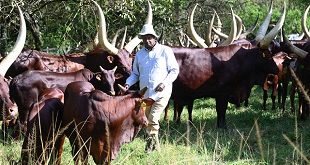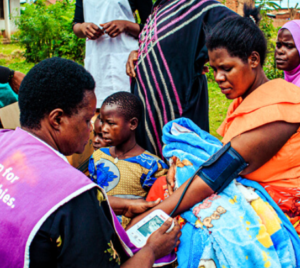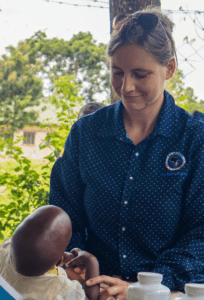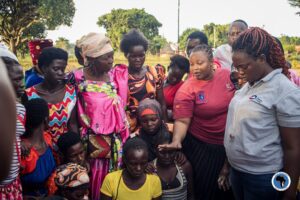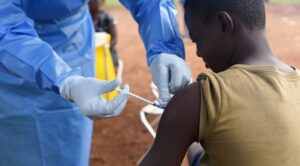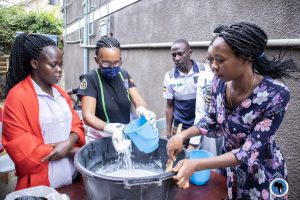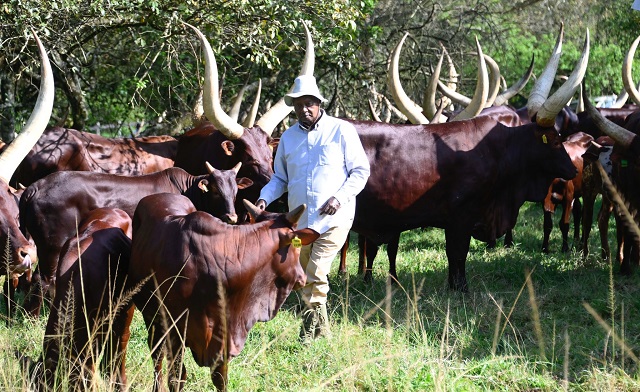
Global scientists want farmers to cut back on livestock production in next 12 years
Kampala, Uganda | RONALD MUSOKE | For a long time, much of the political focus on climate change has been on the global energy transition. What is also needed, however, is a food transition – especially away from high greenhouse gas emitting livestock production. That is what a new report titled, “Options for a Paris-Compliant Livestock Sector” is proposing.
Published by researchers from Harvard University, New York University, Leiden University, and Oregon State University on March 12, the report spells out timeframes, targets and trajectories for the global livestock sector greenhouse gas emissions that have to be met.
Based on a survey of climate scientists from around the world, the report recommends that global emissions from livestock must drop by about 60% over the next 12 years to align with the goals of the 2015 Paris Agreement on climate change mitigation, adaptation, and finance. The targeted culprit is methane; the main greenhouse gas produced in grazing systems around the world.
Billions of ruminant livestock around the world especially cattle, sheep, and goats produce methane (from fermentation of feed in their stomachs) which is then belched out into the atmosphere. Livestock urine and dung deposition also contain a high concentration of nitrous oxide another greenhouse gas.
Some estimates put methane emissions from livestock at about 2.2 billion tonnes of carbon dioxide equivalent, accounting for about 80% of agricultural methane and 35% of the total anthropogenic (human-induced) methane emissions. The same livestock sector is said to emit about 75% of agricultural nitrous oxide.
There are also other greenhouse gas emissions from livestock production-related activities such as fossil fuels used for associated farm activities; nitrous oxide emissions from fertilizer use, methane release from the breakdown of fertilizers and from animal manure, and land-use changes to feed production.
Climate scientists say all these activities combined contribute to the warming of the earth, a phenomenon which is exacerbating the climate crisis around the world. Now, the researchers want all aspects of society to be radically transformed to align with the requirements of the Paris Agreement that limit global temperature rise to a maximum of 2°C above pre-industrial levels. They say, a reduction in the production and consumption of livestock products has the potential to make very large contributions to this target.
However, they also argue that achieving emissions reductions should not come at the cost of animal welfare and should not result in an increased number of farmed animals. They, for instance, rule out measures that further confine animals, or other options that could raise the farmed animal population such as shifting from beef to chicken meat.
Research findings
The research sets out a new understanding of livestock within the context of climate change goals, and new expectations for climate policy – providing the first set of greenhouse gas emissions trajectories for the global livestock sector.
According to the report, most experts (92%) agree that reducing emissions from the livestock sector is important and that livestock emissions should be reduced as much as possible to reduce the risk of temperatures exceeding 1.5°C (87%) or 2°C (85%).
Dr Helen Harwatt, the Food & Climate Policy Fellow with the Brooks McCormick Jr Animal Law & Policy Programme at Harvard Law School led the research. She says she considers this to be a vital piece of the picture needed to move forward with climate plans.
“The research findings provide much needed clarity on a key question – what role should the livestock play in meeting the Paris Agreement? The experts surveyed suggest it’s a major and critical role that should begin immediately.
“How much and when livestock reduction should contribute to climate goals has until now been unclear – but these findings provide some clarity for policy makers grappling with these issues, and can help with the formation of plans to tackle climate change,” said Dr Harwatt.
“We’re way behind schedule on this, and technological solutions alone are inadequate. Difficult decisions are inevitable – and well-designed policy, communicated effectively, is essential.”
The researchers reached out to 210 respondents many of whom are highly experienced climate scientists and food/agriculture experts based in 48 countries. About 60% of the respondents have authored Intergovernmental Panel on Climate Change (IPCC) reports. The experts’ responses to 19 questions contained in the researchers’ survey reveal differences in how each country should respond.
The emissions trajectories
Experts state that global greenhouse emissions must peak by 2025 and so must the number of farmed animals. “The report essentially provides the first articulation of a Paris-compliant livestock sector. The reduction targets for livestock suggested by the survey results are in line with what the IPCC show is needed globally for all emissions and sectors.”
So, it appears that the experts are suggesting a reasonable pathway for the livestock sector. According to the report, emissions from livestock must peak by next year (2025) in both rich countries and middle-income countries and, in the next six years, in poor developing countries like Uganda.
Following the peak, livestock emissions should fall rapidly in both rich and poor countries. All countries should also have a greenhouse gas reduction target for livestock production, in alignment with an overall global reduction target of 61% by 2036.
“The emissions trajectories for livestock outlined by the experts recognise key differences in how countries should act on this issue – there isn’t a blanket approach or a one size fits all countries – and the results reflect that. High producing and consuming countries must do the most the soonest, and have the most ability and potential to achieve this,” says Dr. Harwatt.
The largest number of experts agree that emissions from livestock must peak before 2025 in rich countries (35%) and in middle-income countries (30%), and globally (28%). The largest number of experts agree that emissions from livestock must peak after 2030 in low-income countries (30%).
In addition, it is considered important by 78% of respondents that absolute livestock numbers also peak globally by 2025. Following the peak, most experts agree that livestock emissions should fall rapidly in rich (89% of respondents) and in middle-incomes countries (75% of respondents).
Most experts agree that all countries should have a greenhouse gas reduction target for livestock production, in alignment with an overall global reduction target.
The largest number of experts agree that reducing the consumption of livestock products (58%) and reducing the number of animals farmed (45%) have potential to make very large contributions to this target, with more moderate contributions identified from reducing the number of animals with large greenhouse gas footprints, efficiency gains through technological advances, manure management, and soil carbon sequestration.
The largest number of experts consider the intensification of livestock production to have little to no contribution to meeting the target. The majority of experts agree that achieving greenhouse reductions should not be at the cost of farmed animal welfare and should not result in an increased number of farmed animals. In order to align with the Paris Agreement, most (85%) experts agree it is important that human diets shift from livestock-derived foods to livestock replacement foods.
The experts suggest that the most substantial shifts would occur among consumers in wealthy countries and middle-income countries, where consumer diets would be expected to shift from current patterns to more plant-based in middle incomes countries and much more plant-based in wealthy countries. In poor countries like Uganda, consumer diets would expect to shift from current patterns to slightly more plant-based.
The results speak to the principle of common but differentiated responsibilities – which has been part of international environmental law since 1992 in that action is required from all countries, but that all countries are not equally responsible.
Country reactions
It remains unclear how countries like Uganda will react to this report. Uganda signed the Paris Agreement in October 2015 and ratified it on 21 September 2016. In accordance with the United Nations Framework Convention on Climate Change (UNFCCC), the government submitted its Intended Nationally Determined Contribution (INDC) in 2015, which later in 2016 became the country’s first INDC following the entry into force of the Paris agreement on 4 November 2016.
As a requirement of the Paris Agreement, the so-called nationally determined contributions (government climate change, policies and plans) are submitted every five years and Uganda submitted its updated INDC with a time frame of 2020 to 2030. Among pledges the government made was improving the management of its livestock sector; particularly along the country’s Cattle Corridor where pastoralist communities pride in keeping large herds of livestock as a store of family wealth.
Millions of households around the country rear livestock on a subsistence basis and the most recent livestock census conducted in 2021 puts the number of cattle, goats and sheep at 11.2 million, 17.1 million and 4.4 million, respectively.
Interestingly, according to Uganda’s climate change national adaptation plan for the agricultural sector published in 2018 by the Ministry of Agriculture, Animal Industry and Fisheries, the contribution of the country’s livestock sub-sector to GDP in Uganda is about 2%.
The government said it intends to promote improved cattle breeds and feeds, improve water availability for livestock through constructing water dams and valley tanks, and establish fodder agroforestry plantations for zero grazing and stall-feeding. The measures, the government said, would reduce emissions by approximately 2.9 million tonnes of carbon dioxide equivalent by 2030.
In support of achieving the emissions targets and trajectories, a number of policy priorities were identified for climate, agriculture and food purchasing – including the provision of financial assistance for farmers to convert their practices away from livestock production where required. Whether these intervention are enough to cut back Uganda’s greenhouse emissions remain to be seen.
Going forward, the researchers recommend global emissions from livestock production must decline by 50% during the next 6 years, and this must be accomplished without negatively impacting farmed animal welfare, or increasing the number of farmed animals.
“High producing and consuming nations must lead the efforts, and policies to support a deep and rapid transition away from livestock production and consumption will be needed,” the researchers say.
Author::: BAGOMBEKA JOB

